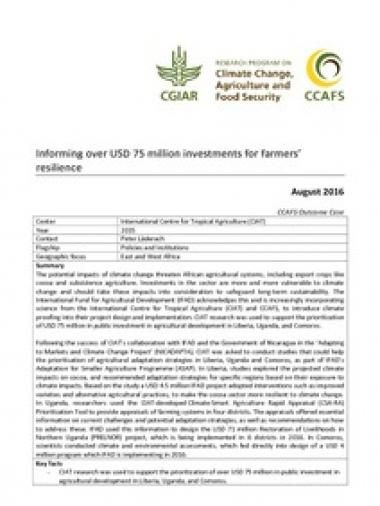Informing over USD 75 million investments for farmers’ resilience

The potential impacts of climate change threaten African agricultural systems, including export crops like cocoa and subsistence agriculture. Investments in the sector are more and more vulnerable to climate change and should take these impacts into consideration to safeguard long-term sustainability. The International Fund for Agricultural Development (IFAD) acknowledges this and is increasingly incorporating science from the International Centre for Tropical Agriculture (CIAT) and CCAFS, to introduce climate proofing into their project design and implementation. CIAT research was used to support the prioritization of USD 75 million in public investment in agricultural development in Liberia, Uganda, and Comoros.
Following the success of CIAT’s collaboration with IFAD and the Government of Nicaragua in the ‘Adapting to Markets and Climate Change Project’ (NICADAPTA), CIAT was asked to conduct studies that could help the prioritisation of agricultural adaptation strategies in Liberia, Uganda and Comoros, as part of IFAD’s Adaptation for Smaller Agriculture Programme (ASAP). In Liberia, studies explored the projected climate impacts on cocoa, and recommended adaptation strategies for specific regions based on their exposure to climate impacts. Based on the study a USD 4.5 million IFAD project adopted interventions such as improved varieties and alternative agricultural practices, to make the cocoa sector more resilient to climate change. In Uganda, researchers used the CIAT-developed Climate-Smart Agriculture Rapid Appraisal (CSA-RA) Prioritization Tool to provide appraisals of farming systems in four districts. The appraisals offered essential information on current challenges and potential adaptation strategies, as well as recommendations on how to address these. IFAD used this information to design the USD 71 million Restoration of Livelihoods in Northern Uganda (PRELNOR) project, which is being implemented in 6 districts in 2016. In Comoros, scientists conducted climate and environmental assessments, which fed directly into design of a USD 4 million program which IFAD is implementing in 2016.
Citación
CCAFS. 2016. Informing over USD 75 million investments for farmers’ resilience. CCAFS Outcome Case. Copenhagen, Denmark: CGIAR Research Program on Climate Change, Agriculture and Food Security (CCAFS).